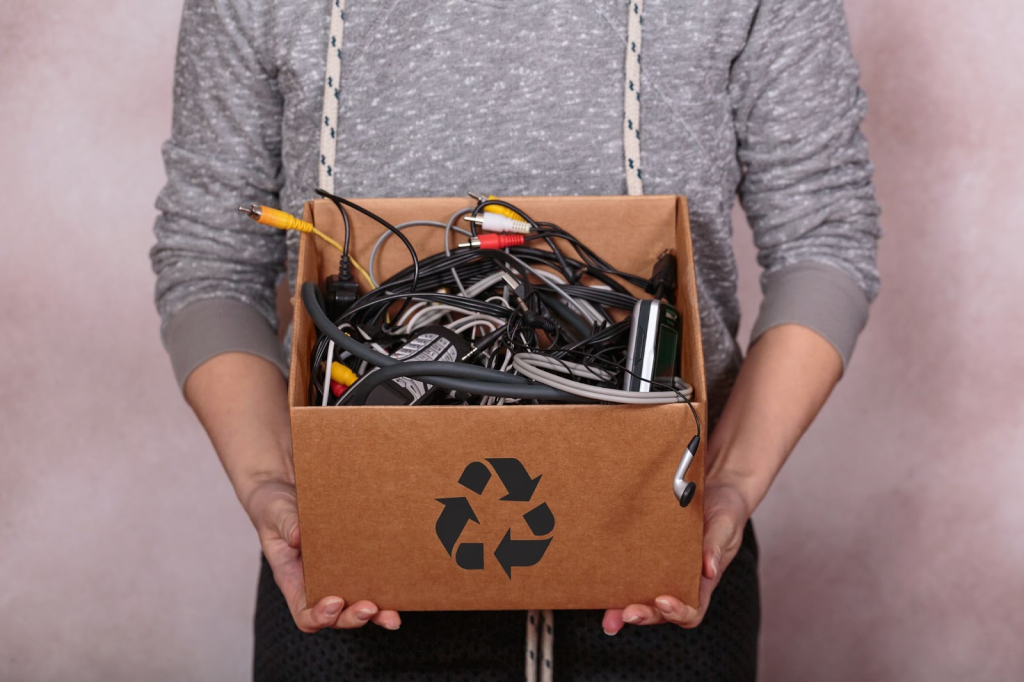Electronic waste disposal is no longer a back-office concern, but a regulatory and reputational issue that affects every business. From data breaches to EPA violations, the risks are real and rising. Companies are upgrading hardware faster than ever, yet many overlook how to legally and safely dispose of obsolete devices. Knowing the proper protocols now can save you from costly fallout later.
Why Electronic Waste Disposal Affects Your Business
Electronic waste disposal affects your business from multiple angles, such as compliance, reputation, cost, and environmental impact. Legal penalties for mishandled waste are steep and increasingly enforced. Poor e-waste handling can trigger customer backlash, especially in industries under public scrutiny. Staying compliant protects your bottom line and builds credibility.
Mishandling E-Waste Pollutes and Risks Legal Action
Improper disposal of electronics leads to environmental harm and legal exposure. Business electronics contain toxic elements like lead, mercury, and cadmium. When dumped without treatment, these substances contaminate soil and water. Environmental regulators are cracking down on violators across states. Companies that ignore these rules may face lawsuits or shutdown orders. Compliance isn’t optional; it’s the cost of doing business.
E-Waste Can Erode Customer Trust and Brand Image
Customers expect responsible disposal as part of your corporate behavior. Mishandling electronics can become a PR issue and damage your ESG credibility. Businesses that show transparency in e-waste practices gain trust from clients and stakeholders. That is especially true for tech, finance, and health sectors. A clean record in disposal supports future partnerships and contract eligibility. It shows you’re aligned with today’s ethical business standards.
Key Electronic Waste Disposal Laws for Businesses
Electronic waste laws vary by region but share a common purpose: to regulate hazardous components and protect public health. U.S. businesses must follow both federal and state regulations, which often differ. Some international laws may also apply if devices are shipped abroad. Staying informed is a legal obligation, not a courtesy.
Federal Rules Under EPA and RCRA Guidelines
The Environmental Protection Agency (EPA) governs national e-waste policies under the Resource Conservation and Recovery Act (RCRA). Businesses handling hazardous e-waste must meet EPA disposal and tracking standards. These include proper classification, transport labeling, and approved disposal methods. Many electronics aren’t harmful per se, but become so due to batteries or chemical components. Partnering with an EPA-recognized recycler reduces risk. Documented proof of compliance may be requested during audits.
Different States, Different E-Waste Rules
Some states impose stricter regulations than federal mandates. California, for instance, requires electronics retailers to collect recycling fees and offer consumer take-back options. New York demands annual reporting from businesses that manufacture or sell electronic equipment. Other states prohibit e-waste from landfills entirely. If your business operates in multiple states, track each jurisdiction’s rules. Failure to align policies can result in inconsistent compliance and surprise fines.
Export Laws and the Basel Convention
If your business ships old electronics overseas, the Basel Convention may apply. This international treaty bans the export of hazardous waste to countries lacking the infrastructure to manage it. The U.S. has not fully ratified the treaty, but many partner nations have. Violations may harm trade relations or draw international sanctions. Consult legal experts before exporting discarded electronics abroad.
What Counts as Electronic Waste in Offices
Electronic waste includes anything that plugs in, stores data, or uses circuitry and is no longer functional or wanted. Businesses generate more than they realize, from employee devices to networking hardware. Recognizing which items qualify can prevent costly missteps.

Common Business Electronics That Require Disposal
Standard office devices like laptops, desktops, monitors, and servers qualify as e-waste. So do phones, printers, external drives, and even surge protectors. Items like power adapters, keyboards, and routers also apply. Some businesses dispose of these with general trash, which violates disposal laws. Each device contains recoverable materials or toxic elements. They require certified recycling or special handling.
Devices Holding Sensitive Data Need Extra Care
Old servers, computers, and mobile devices often store confidential data. Before disposal, data must be irreversibly destroyed using software or hardware methods. Simply deleting files or factory-resetting isn’t enough. Data breaches from improperly discarded devices have led to lawsuits and fines. Work with IT asset disposition (ITAD) firms that offer certified data destruction. They help protect your business from liability.
Items Prohibited from Landfill Disposal
Some electronic devices are outrightly banned from landfill sites. These typically include CRT monitors, lithium-ion batteries, and devices with fluorescent components. Local disposal laws often list which items need regulated disposal. Businesses found violating landfill bans may face environmental citations. Use designated collection centers or recycling partners familiar with landfill restrictions.
How to Comply with E-Waste Disposal Requirements
Compliance requires planning, record-keeping, and the right partnerships. Businesses must track what they dispose of, how it’s destroyed or recycled, and who handles it. Regular reviews help ensure policies stay up to date with current laws.
Conduct an E-Waste Inventory Audit
An e-waste audit logs every electronic device in your workplace. Record serial numbers, device types, usage status, and potential data risks. Flag obsolete or non-functional devices for safe disposal. Track storage locations and assign accountability to help you plan replacements and disposal without guesswork. Update the inventory each quarter or after a significant IT change.
Work Only With Certified Recyclers
Only use certified e-waste recycling vendors. Look for certifications like R2 (Responsible Recycling) and e-Stewards. These designations show the recycler meets environmental and data security standards. Ask vendors for documentation, such as downstream tracking or destruction certificates. Keep these records on file for proof of compliance. Vetting your recycler is part of your compliance duty.
Document Each Disposal Transaction
Every e-waste transaction should be logged and filed, including vendor invoices, chain-of-custody records, and destruction confirmations. Use a central document management system to store all records. If regulators request proof of lawful disposal, you’ll have everything on hand. Digital logs also support ESG reporting and investor transparency. Make it part of your monthly compliance review.
Best E-Waste Practices for Business Operations
Following best practices protects your business, brand, and customer trust. Responsible disposal reduces risk and enhances operational efficiency. These actions also support internal sustainability goals.

Secure Data Destruction Before Disposal
Never dispose of electronic devices with data still intact. Use certified data erasure software or industrial-grade shredders. Request a destruction certificate from your disposal vendor, and store certificates in a compliance folder accessible during audits. Set policies requiring IT approval before devices leave the building. Secure data destruction should be mandatory, not optional.
Consider Donations or Internal Repurposing
Not all outdated electronics are unusable. Devices that still function can be donated to schools or nonprofits. Others can be repurposed internally as backups or training tools. Always wipe and refurbish equipment before reassigning it. These options reduce disposal costs and extend equipment value. Keep donation receipts for tax reporting.
Train Employees on E-Waste Policies
Create a written policy explaining how employees should handle old electronics. Include steps for wiping data, contacting IT, and where to store discarded devices. Review the policy during onboarding and annual compliance training. Encourage employees to report unused devices rather than storing them. A well-informed team reduces mistakes and improves safety. Keep policies visible on your intranet or shared drive.
Sector-Specific E-Waste Requirements to Know
Some industries must meet tighter standards due to the nature of their data or contracts. These sectors need specialized disposal plans and partners. Ignoring these requirements can cost you government contracts or industry certifications.
Healthcare Providers Must Follow HIPAA Disposal Rules
Medical facilities and service providers must dispose of devices according to HIPAA. Devices storing patient data must be wiped out or destroyed using approved methods. Violations can lead to hefty fines and publicized investigations. Use vendors with healthcare disposal experience and keep full logs. Even tablets and USB drives fall under HIPAA oversight. Never assume a device is too small to matter.
Financial Firms Face Strict Data Disposal Rules
Banks, fintech, and investment companies must protect sensitive financial data, including customer account information, transaction records, and audit logs. Regulations like GLBA and SOX require formal data destruction and tracking. Devices must be logged, destroyed, and verified. Choose disposal vendors with financial industry clients. Regulators expect thorough documentation and airtight protocols.
Government Contractors Need Federal Compliance
Companies working with federal agencies must meet extra disposal rules. These may include FISMA, NIST SP 800-88, or FedRAMP standards. Many contracts require on-site data destruction before hardware leaves the facility. Missteps can disqualify you from future bids. Select partners who understand federal IT asset disposal. Federal audits are detailed and unforgiving.
Long-Term Strategy for Business E-Waste Disposal
Electronic waste will continue growing, but businesses can get ahead by building a strategy. A strategy helps you reduce costs, meet goals, and avoid last-minute decisions. Treat e-waste like any other long-term risk area.
Align E-Waste Handling With Sustainability Goals
E-waste strategy supports ESG targets and stakeholder expectations. Recycling reduces carbon footprint and landfill impact. Reuse and refurbishment minimize new equipment purchases. Include disposal metrics in your ESG reports to make your efforts measurable and visible. Stakeholders now ask how tech is handled, not just how it’s used.
Watch for Regulatory Changes and New Tech
Tech evolves, and so do e-waste risks. Edge devices, IoT hardware, and AI servers all pose disposal challenges. Regulatory bodies are adjusting rules in response. Subscribe to newsletters or work with consultants for updates. Review policies annually to stay current. What worked last year might not meet new standards.
Make Electronic Waste Disposal a Business Priority
Delaying e-waste management invites bigger problems. Fines, data leaks, or damaged partnerships can follow. Innovative businesses don’t treat e-waste as an afterthought. They integrate disposal into procurement, training, and compliance workflows. If you haven’t reviewed your disposal process lately, now is the time to do it. Your business can’t afford to fall behind.
Explore more expert tips and updates on electronic waste disposal. Visit the Top Dog Waste Solutions blog today.








